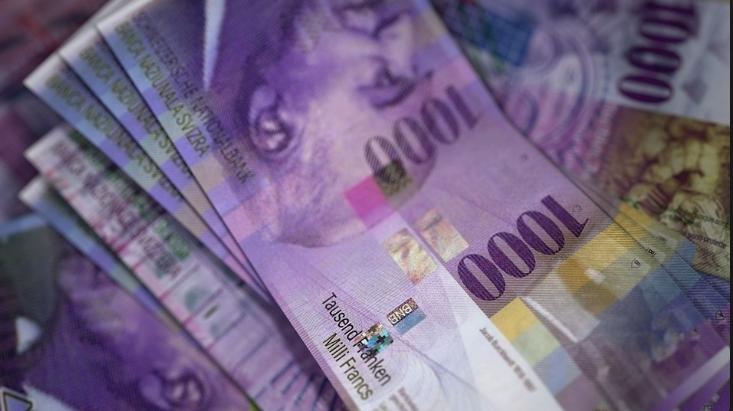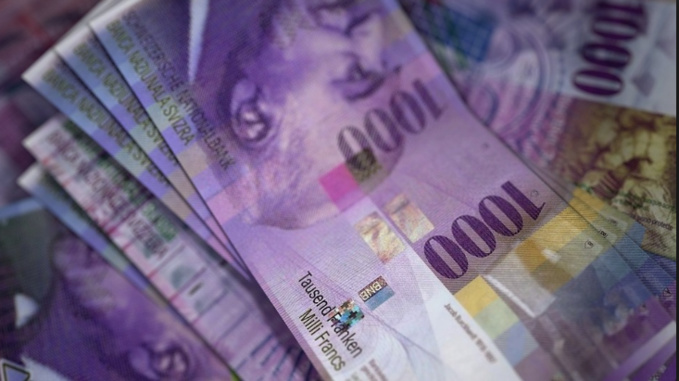Analysts looked at two years-old events and came to a conclusion that sharp appreciation of the franc in 2015 did not lead to a recession. However, the economy still feels consequences of this event, and remains weak, says Bloomberg agency.
A stronger franc will not fully restore the economy, and should be used with additional tools for complete recovery.
"We swallowed strong franc, but were not able to digest the events and take the path of economic recovery. There are a lot of different sectors, which draw a trail of economic shocks. In particular, the industry is still limping "- says Hans Hess, President of Swissmem association.
One of the reasons is a weak performance, which is why the franc jumped in price by 1.8% against the euro during the last three months of 2016. Investors are also unconfident. The market participants are still under pressure of shift of power in America, harsh statements the White House’s head Donald Trump and Brexit events. Since the beginning of this year, value of the Swiss national currency increased by 0.7% as investors considered the currency a "safe harbor" to hide from the US policy of President Donald Trump, upcoming Brexit, as well as the presidential election in France.
The manufacturing sector, retail trade and tourism have been severely affected by to the strong franc. Yet, accelerated pace of economic growth in the euro area could support the Swiss economy, experts say. Swiss GDP grew by 1.3% in 2016, but rate of recovery didn’t meet SECO forecast of 1.5%.
Despite the fact that the Swiss franc rose by 26-28% against the dollar and the euro in 2015, it has had no effect on real economic growth. Yet, forecasts for 2017 are quite optimistic. In particular, analysts expect a tangible increase in export performance. In 2015, the Swiss National Bank has unexpectedly withdrawn limit for the franc, introduced in September 2011. Then, inflow of capital into Switzerland during the euro zone debt crisis significantly strengthened the franc, yet negatively affected the Swiss exporters. The Central Bank then set a ceiling of 1.2 francs for the franc-euro pair fluctuations, and had been keeping it and buying up billions of euros. When the restriction was lifted, the franc reached parity with the euro and continued to grow.
At the same time, Swiss GDP grew in the IV quarter of 2016 by 0.6% compared to the same period last year, according to the Swiss State Secretariat for Economic Affairs (SECO). In III quarter, the index increased by 1.4%. Pace of economic growth in the country slowed down since exports and business investment fell. Growth of the Swiss economy in the October-December compared with III quarter was 0.1%, just like in the previous 3 months.
The strong local currency is a negative factor for the export-oriented Swiss economy. The country's central bank regularly declares that it considers the Swiss franc "significantly overvalued."
source: bloomberg.com
A stronger franc will not fully restore the economy, and should be used with additional tools for complete recovery.
"We swallowed strong franc, but were not able to digest the events and take the path of economic recovery. There are a lot of different sectors, which draw a trail of economic shocks. In particular, the industry is still limping "- says Hans Hess, President of Swissmem association.
One of the reasons is a weak performance, which is why the franc jumped in price by 1.8% against the euro during the last three months of 2016. Investors are also unconfident. The market participants are still under pressure of shift of power in America, harsh statements the White House’s head Donald Trump and Brexit events. Since the beginning of this year, value of the Swiss national currency increased by 0.7% as investors considered the currency a "safe harbor" to hide from the US policy of President Donald Trump, upcoming Brexit, as well as the presidential election in France.
The manufacturing sector, retail trade and tourism have been severely affected by to the strong franc. Yet, accelerated pace of economic growth in the euro area could support the Swiss economy, experts say. Swiss GDP grew by 1.3% in 2016, but rate of recovery didn’t meet SECO forecast of 1.5%.
Despite the fact that the Swiss franc rose by 26-28% against the dollar and the euro in 2015, it has had no effect on real economic growth. Yet, forecasts for 2017 are quite optimistic. In particular, analysts expect a tangible increase in export performance. In 2015, the Swiss National Bank has unexpectedly withdrawn limit for the franc, introduced in September 2011. Then, inflow of capital into Switzerland during the euro zone debt crisis significantly strengthened the franc, yet negatively affected the Swiss exporters. The Central Bank then set a ceiling of 1.2 francs for the franc-euro pair fluctuations, and had been keeping it and buying up billions of euros. When the restriction was lifted, the franc reached parity with the euro and continued to grow.
At the same time, Swiss GDP grew in the IV quarter of 2016 by 0.6% compared to the same period last year, according to the Swiss State Secretariat for Economic Affairs (SECO). In III quarter, the index increased by 1.4%. Pace of economic growth in the country slowed down since exports and business investment fell. Growth of the Swiss economy in the October-December compared with III quarter was 0.1%, just like in the previous 3 months.
The strong local currency is a negative factor for the export-oriented Swiss economy. The country's central bank regularly declares that it considers the Swiss franc "significantly overvalued."
source: bloomberg.com



















